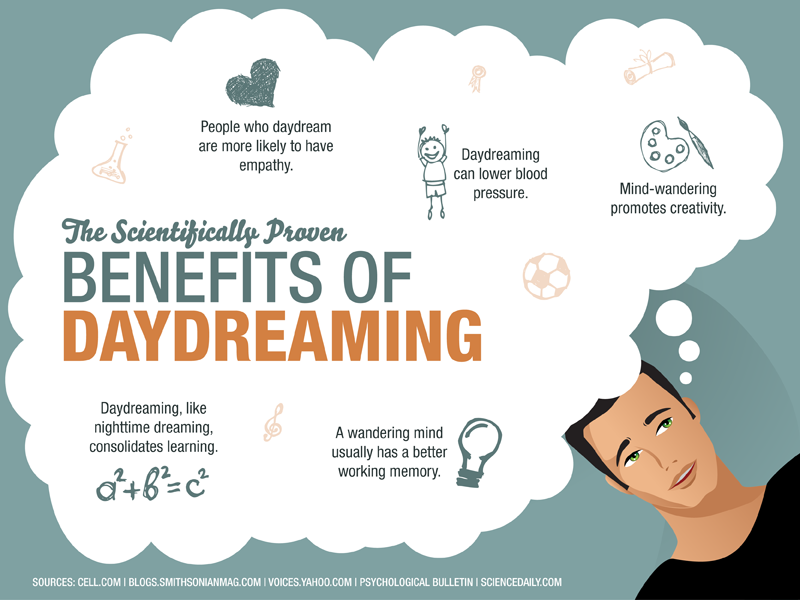Daydreaming has long been brushed off as a useless waste of time,
a state in which we’re just zoning out and not getting anything done. But recent research has shown that daydreaming can actually be quite useful and offers a host of benefits. From improving your memory and creativity to lowering your blood pressure, there are several scientifically proven benefits of daydreaming that will encourage you to dream on.
- Daydreaming helps us explore new ideas and uses: In a University of California at Santa Barbarastudy, students who were given an extremely boring task, meant to elicit mind-wandering, were better able to come up with ideas for unusual ways to use items. That means when we’re given the opportunity to daydream, our unconscious minds can think of creative solutions to problems.
- Mind-wandering promotes creativity: Another study from UCSB indicates that there’s a distinct correlation between daydreaming and increased creativity. In fact, people who are more prone with daydreaming are typically skilled in being able to creatively generate new ideas. It seems that consciously paying attention to a problem isn’t the best way to solve it—daydreaming and letting the mind figure it out is.
- A wandering mind usually has better working memory: According to research from the University of Wisconsin, Milwaukeeand the Max Planck Institute for Human Cognitive and Brain Science, people who have a tendency to let their mind wander often have a more active and well-equipped brain, as well as a higher degree of working memory. In their study, researchers found that participants who daydreamed during easy tasks were more likely to remember information, even when distracted, indicating a higher level of working memory. Researchers believe that the mental process of daydreaming is actually very similar to the brain’s working memory system.
- Daydreaming can lower blood pressure: Researchers from the Anti-Stress Center have found that daydreaming is a form of hypnosis, and can lower stress levels as well as blood pressure. People who are experiencing anxiety and stress can spend time daydreaming to relieve stress, as well as enjoy the benefits of lowered blood pressure. Further, psychiatrists from the Menninger Clinic believe that daydreaming allows you to mentally rehearse steps, such as flying for an upcoming trip, and make you better prepared to handle the events when they happen.
- Reflection helps aid development and well-being: Researched published in Perspectives on Psychological Scienceindicates that looking inward and reflecting through daydreaming can help us better build memories and improve our attention spans. Time spent letting your mind wander can make the quality of your outward attention better. In fact, the research proved that students who were given time and skills necessary for reflection performed better on tests, reduced anxiety, and became more motivated.
- Daydreamers are better problem solvers: Although we once thought that our minds are at rest when we’re daydreaming, research from the University of British Columbia suggests that we’re actually solving problems. Through fMRI scans, researchers found that activity in the complex problem-solving areas of the brain were highly active during daydreaming episodes. People who are having trouble solving complicated problems might be well served to let go of their immediate goal, and just let their mind wander with a simple task instead.
- Daydreaming, like nighttime dreaming, consolidates learning: The same research from the University of British Columbia shows that daydreaming can actually consolidate learning. It’s been widely established that sleep and nighttime dreaming is an important part of the learning and memory process, but this research shows that daydreaming plays a major part as well. Need to remember what you’ve just learned? Instead of cramming it in your brain, daydreaming may be a more effective approach.
- You can improve your IQ with daydreaming: Allowing your brain to “rest” through daydreaming can help to improve your IQ. When daydreaming, it seems that distant areas of the brain are better able to communicate, and improving this function with practice can aid in intelligence. This is only true, however, for “good daydreaming,” as in, when the mind is exploring imagination or creativity. “Bad daydreaming,” like focusing on a negative comment, does not improve IQ.
- With daydreaming, you can invent the theory of relativity, or win a Nobel Prize: Noted daydreamers include Albert Einstein and Nobel prize-winning molecular biologistElizabeth Blackburn. It’s believed that Einstein’s theory of relativity was born as he was daydreaming about running to the edge of the universe. Blackburn has widely noted that daydreaming greatly contributed to her success and has seen it work for some of the most creative and successful scientists in her life as well.
- You can build empathy with daydreaming: Research published in Psychological Bulletinindicates that people who daydream are more likely to have empathy. Studying Israeli high school students, researchers observed that students with high scores on the Daydreaming Scale of the IPI demonstrated more empathy than students who scored low on the scale. Spend more time daydreaming, and you just might become a more compassionate person.
]Originally posted on bachelorsdegreesonline.com]

